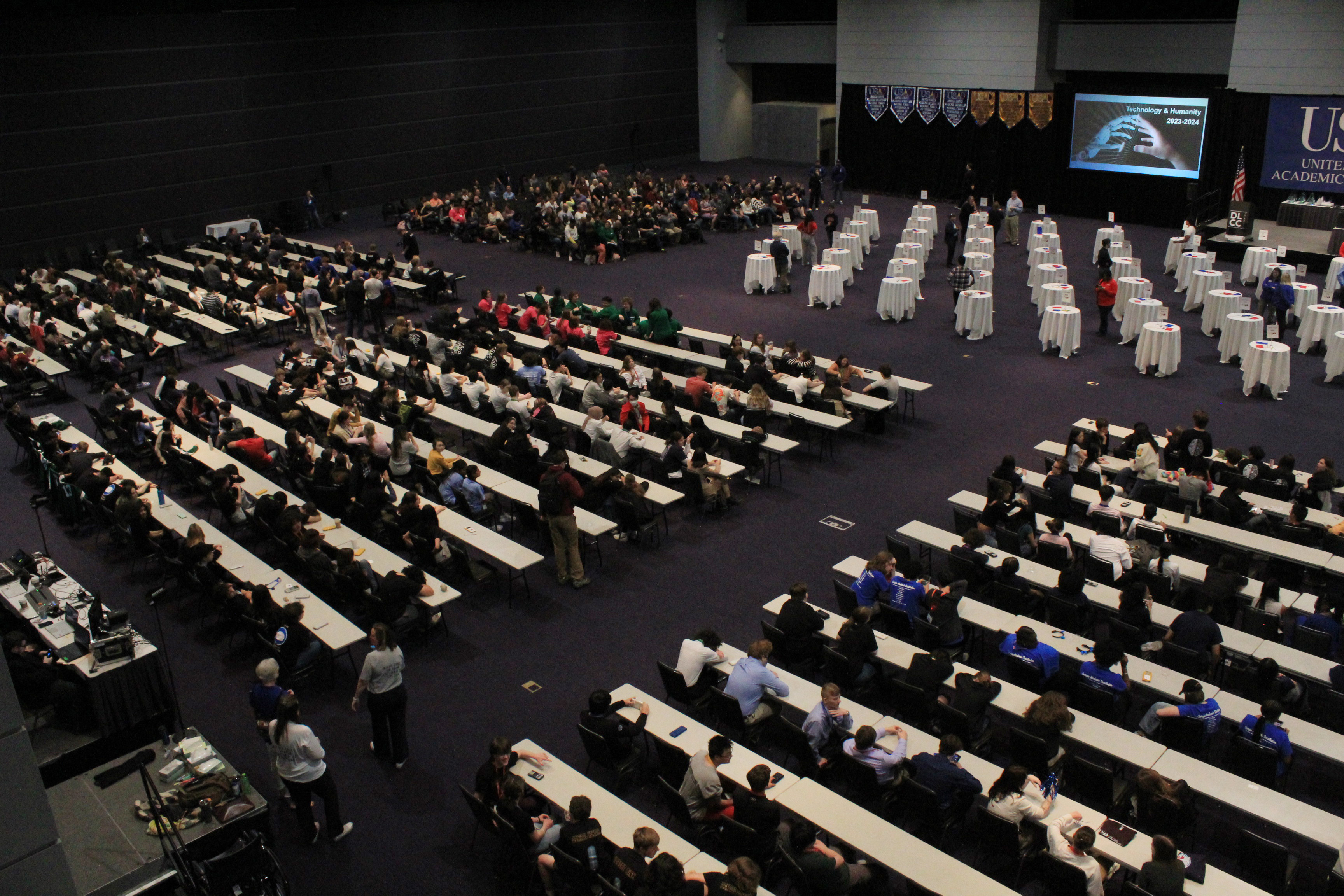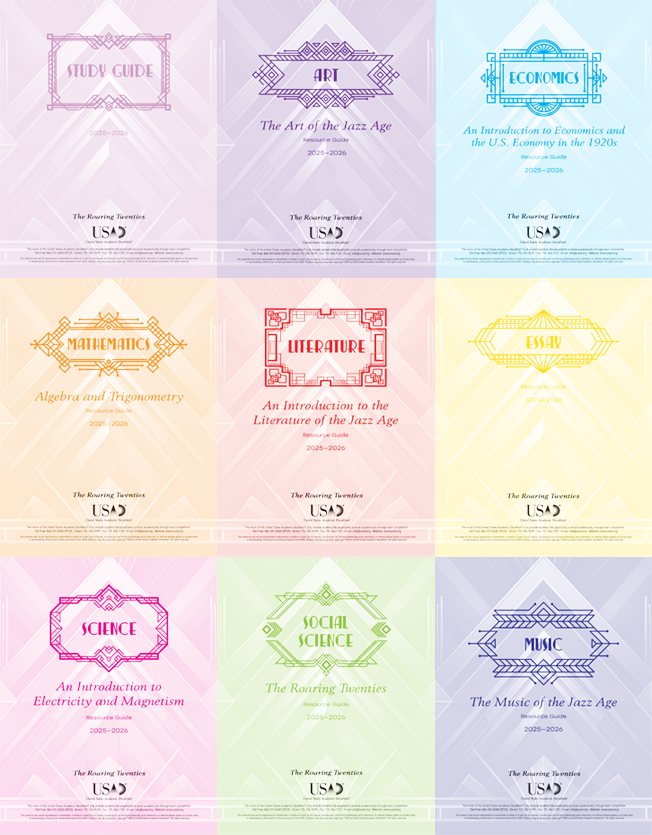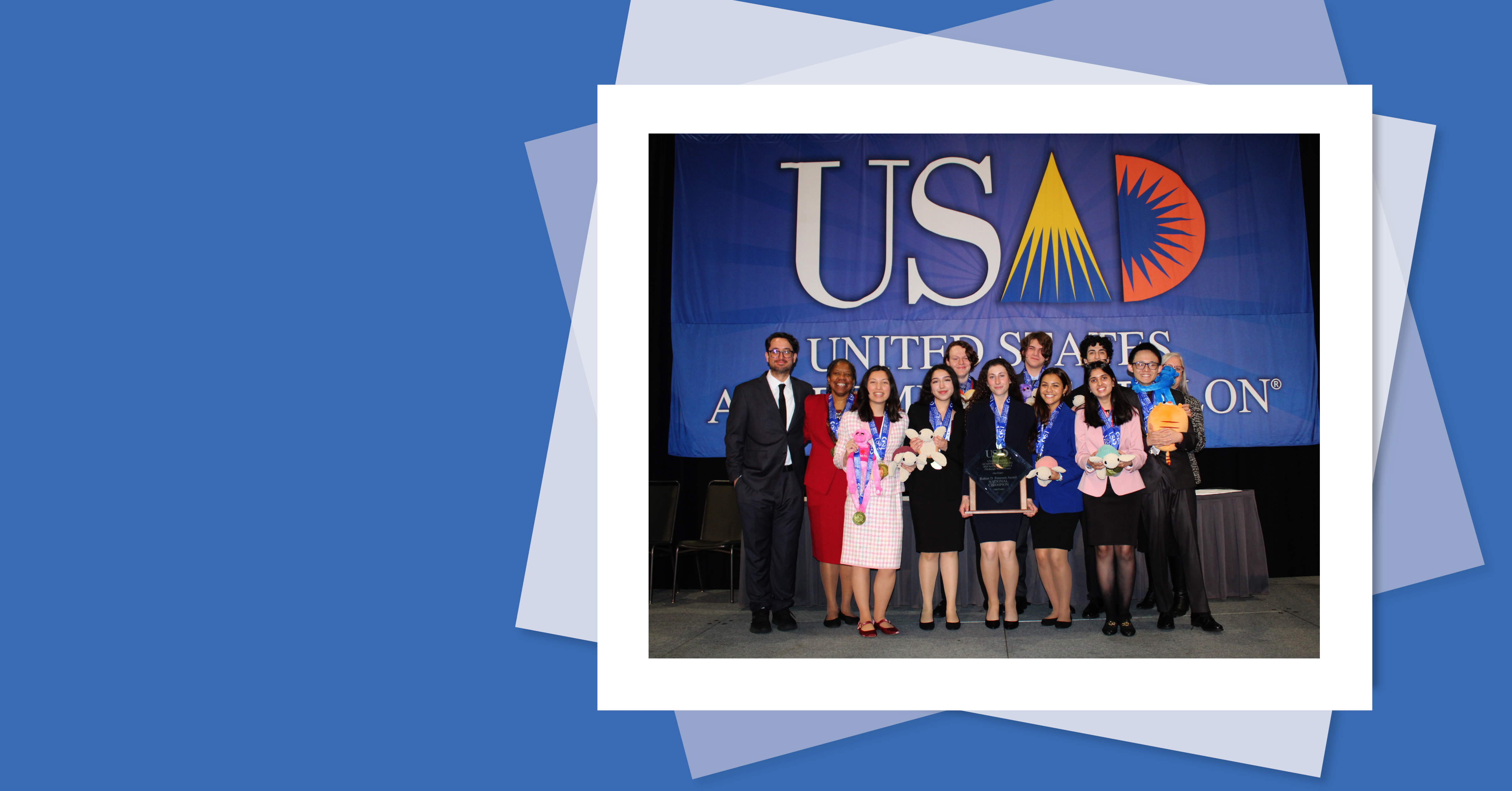There are lots of wonderful academic competitions out there. You can go prove you’re the best writer, or the best physicist, or the best speller.

Academic Decathlon isn't about any of that, though. It’s not about demonstrating how good a student you already are. It’s about daring to push your limits, to master college-level material and to practice skills, like public speaking, that might be wholly new to you. It’s about the people you’ll meet along the way—the coaches who will mentor you, the competitors who will challenge you, and the teammates who will become your lifelong friends.
My daughter competed in Academic Decathlon at three different schools in two states. At one school, she started the team herself, recruiting a teacher and her friends to give the program a try. At another, she joined a team with a long tradition. Both times, I watched her and her teammates share an incredible experience, navigating the challenges of teamwork, leadership, and time management. No other activity, she later said, better prepared her for university.
As Decathletes, you’ll learn about an exciting new theme each year, such as Russia, World War I, and New Alternatives in Energy: Ingenuity and Innovation. You’ll explore six subjects connected to that theme, from art and science to literature and economics. You’ll learn to move an audience not just with facts and rhetoric, but with confidence. And you’ll never do any of this alone. You’ll be working with a team—a team composed of students with a wide range of grades but a single shared goal.
You should join the Academic Decathlon not because that goal will be easy to achieve, but because it will be hard. You and your teammates may study more than you ever have before, not knowing whether you will take home ten medals each—or none at all. The philosopher Mortimer Adler once wrote, “It is only by struggling with difficult books, books over one's head, that anyone learns to read.” I invite you to become part of a program that you may think is over your head, until you realize you can reach higher as a team. I invite you to struggle. And I invite you to learn—not just to read, but to understand; not just to win, but to lead.
Dr. Les Martisko
USAD Administrator
Academic Decathlon® isn’t about mastering a single event, but ten different skills and disciplines.
Every
Academic Decathlon competition, whether it’s a local round or the national
finals, will follow the same multidisciplinary format.
You’ll
deliver speeches, one on a topic of your choice and one on a topic you’ve never
seen before.
You’ll write an essay demonstrating not just what you’ve learned but how powerfully you can argue an idea.
Judges will
interview you, asking thoughtful questions about your past experiences and your
goals for the future.
You’ll take
challenging exams in Art, Economics, Literature, Math, Music, Science, and
Social Science.
And, at the
exciting Super Quiz™, you and your teammates will take turns solving the most
stimulating challenges of all from across every subject you’ve studied—while a
live audience cheers you on.
You’ll always learn something different.
Each year, the Academic Decathlon selects a new theme for teams all over the country to explore. The theme shapes an entire course of studies - and brings it all together. The more years you participate in Academic Decathlon, the more themes you’ll master. And, since our curriculum team develops these themes with special attention to national content standards, you’ll find you’re becoming not just a more knowledgeable Academic Decathlete, but a stronger all-around student.

The U.S. Academic Decathlon is excited to announce that the overall curricular theme for 2025–2025 will be:
The Roaring Twenties.
The following is some general information on the topics in each of the subject areas.
- ART: USAD’s art curriculum introduces students to the history of art—from ancient civilizations to the modern world—and focuses in-depth on eighteen artworks, including paintings, sculptures photographs, and works of architecture, that connect to the overall curricular theme.
- ECONOMICS: USAD’s economics curriculum presents a comprehensive overview of economic fundamentals, microeconomics, and macroeconomics and includes a focused case study that ties into the curricular theme.
- ESSAY: USAD’s essay component offers students a chance to refine their writing skills and apply their knowledge of the Academic Decathlon curriculum. Students are given 50 minutes to respond to a prompt that may focus on art, economics, literature, music, science, or social science.
- INTERVEIW: USAD’s interview event allows students to develop their communication skills by participating in an interview with a panel of judges. Students respond to questions about their past activities as well as their future plans.
- LITERATURE: USAD’s literature curriculum offers a view of the curricular theme through a literary lens and provides students with a guided analysis of one long work and several shorter works. The featured works can range from novels and plays to poems, essays, speeches, and short stories.
- MATHEMATICS: USAD’s mathematics curriculum is independent of the curricular theme and offers students an opportunity to reinforce and improve their knowledge of standard high school mathematics topics, including algebra, geometry, statistics, trigonometry, and calculus.
- MUSIC: USAD’s music curriculum explores the connections between the curricular theme and the world of music. Students are given an overview of the elements of music theory and learn in-depth about fourteen musical works that relate to the curricular theme. Works can range from classical to popular music, from Gregorian chants to jazz and rock and roll.
- SCIENCE: USAD’s science curriculum focuses on a scientific field that relates to the curricular theme. Past science topics include marine biology, astronomy, the biology of cancer, laser technology and its applications, neuroscience, environmental science, and the biology of infectious diseases, among others.
- SOCIAL SCIENCE: USAD’s social science curriculum offers students the chance to explore the curricular theme in-depth. Past topics include, among others, the 1960s, the history of healthcare, the Cold War, water’s role in human history, the American Revolution and the founding of the United States, the history of computers, and climate change in the past and present.
- SPEECH: USAD’s speech event gives students an opportunity to develop and refine their verbal communication skills. Students prepare and present a four-minute speech on a topic of their choosing and give a two-minute impromptu speech in response to a given prompt. demonstrate individual excellence.
2025–26 mathematics curriculum and materials will be the same as were used for the 2022–23 U.S. Academic Decathlon.
Check out this year's curricular topics here!
As a Decathlete, you'll participate in five different types of events.

Below are the rules and guidelines you'll need to master them, one team practice session at a time.
Super Quiz™
In the Super Quiz, you and your teammates will take turns solving tough multiple choice
challenges in front of a live audience. At the national finals, you'll collaborate with two of your teammates to
figure out the best answer to each question before time runs out. (You'd better have a plan for when you
disagree!) The exact format of the Super Quiz varies from state to state, but it is always the last event, the
loudest, and the most intense: a high-stakes celebration of all the subjects you've learned.
Speech
In the prepared speech, you'll speak for up to four minutes on any topic you'd like. A word of
advice: choose early, practice often. Afterward, you'll be asked to speak off the cuff for up to two minutes on a
topic you haven't seen before. If you've never given a speech, don't worry: you're not alone. Many Decathletes cite
learning to speak in public as one of their most transformative experiences in the program.
Interview
In the interview, you'll have seven minutes to answer questions about a subject you shouldn't
need to research very much: yourself. Learning to listen closely and to present yourself in a compelling way is
another skill that will benefit you for the rest of your life, whether it's during your college interviews, on the
job, or at dinner with your future parents-in-law. Be ready to answer questions about your background, your
interests, and your goals, and never forget to thank your judges for volunteering.
Essay
You'll have fifty minutes to write the strongest paper possible. To get ready, you'll want to
practice outlining and writing compelling arguments related to six of the seven Academic Decathlon
subjects—excluding only math. The more clearly you can learn to write, the more persuasive you'll be—and the
more you've studied the theme, the more evidence you'll be able to cite on whatever topic you face on competition
day.
Tests of Knowledge
The Decathlon is more a marathon than a sprint. To round out the events above, you'll
take seven multiple choice exams, one in each of the Academic Decathlon subjects: Art, Music, Social Science,
Science, Economics, Literature, and Mathematics. You'll find yourself developing better critical thinking and
test-taking skills that will serve you well on everything from the SAT to your college finals. In the short run
you'll also have the chance to win something much shinier: medals in every subject. The more well-rounded you
are, and the further you go outside your comfort zone, the more you'll win—a chance, even in a team sport, to
demonstrate individual excellence.
USAD Nationals
Show off everything you remember at a competition you'll never forget; once a year, we invite qualifying teams in every state to join us for an electrifying finale to the Academic Decathlon season. The national competition is more than ten challenging events and a championship to be won—it’s your chance to meet fellow Decathletes from across the United States. You’ll trade not just speech topics, but war stories; not just Instagram invites, but lifelong insights.
Future
USAD Nationals:
- 2026 – Garden Grove,
CA; April 23 – 25 2026
- 2027 – Bloomington, MN; April 29 – May 1 2027
Individual Competition
Our new individual competition offers students a way to experience all the excitement and learning of the United States Academic Decathlon even without a team.
You’re eligible if:
- You’re in a non-traditional school setting.
- You’re at a school that doesn’t participate in United States Academic Decathlon.
- You’re at a school that does participate in United States Academic Decathlon, but you’re not a competing member of
the team.
The individual competition offers students a way to experience all the excitement and learning of the United States Academic Decathlon event without a team. Please reach out to your local state director for more details.

